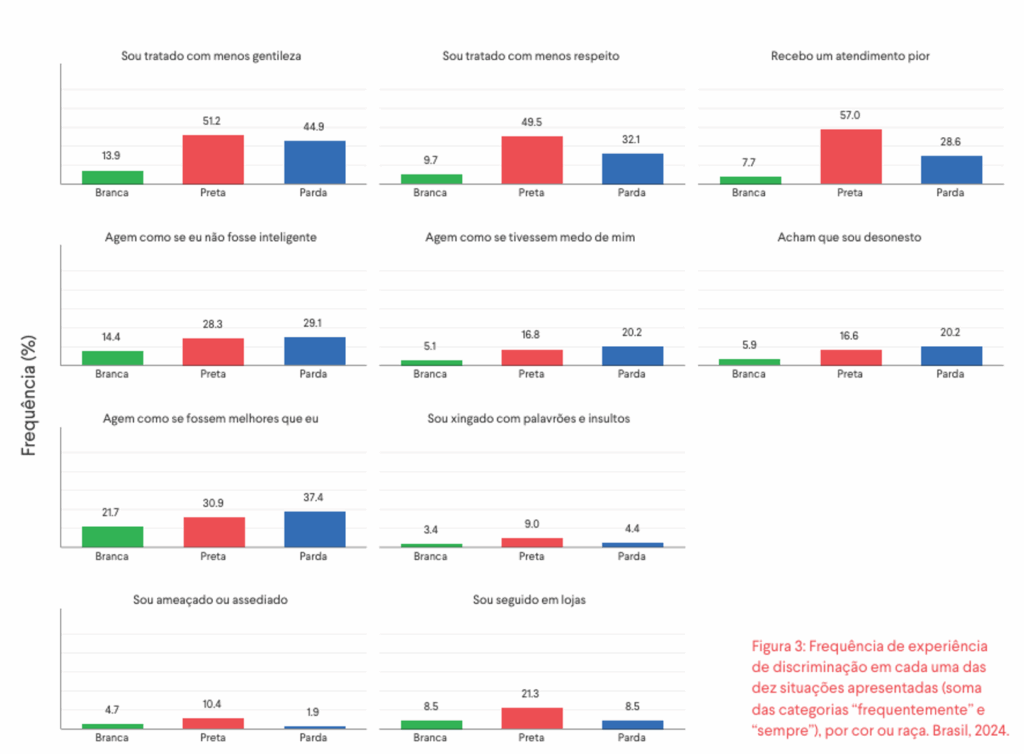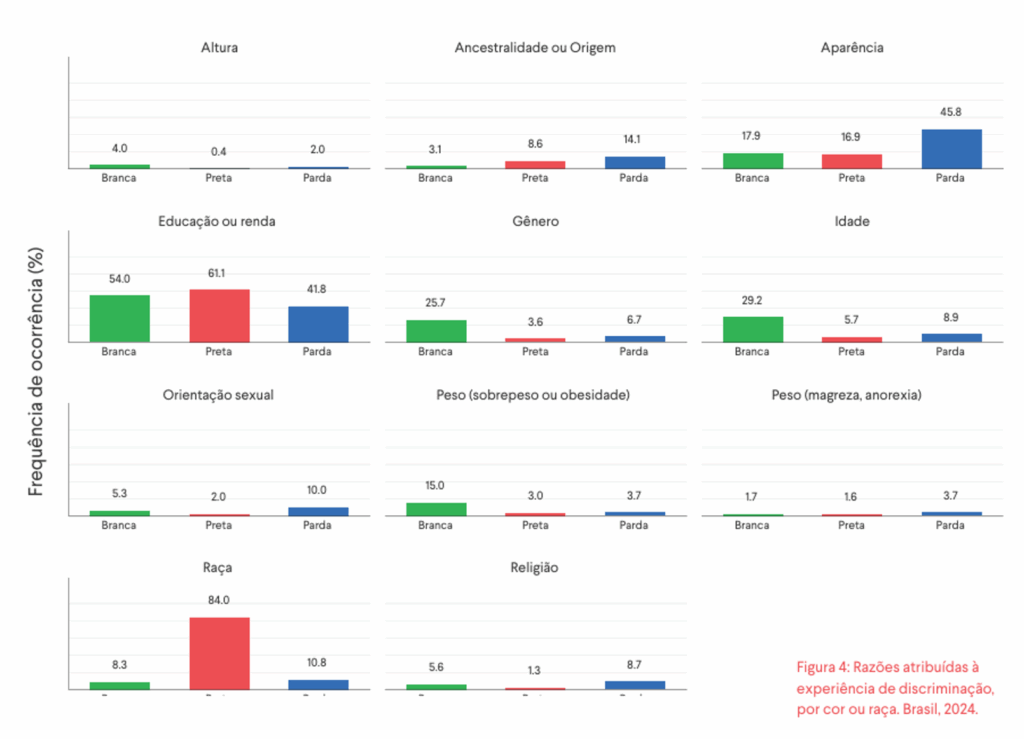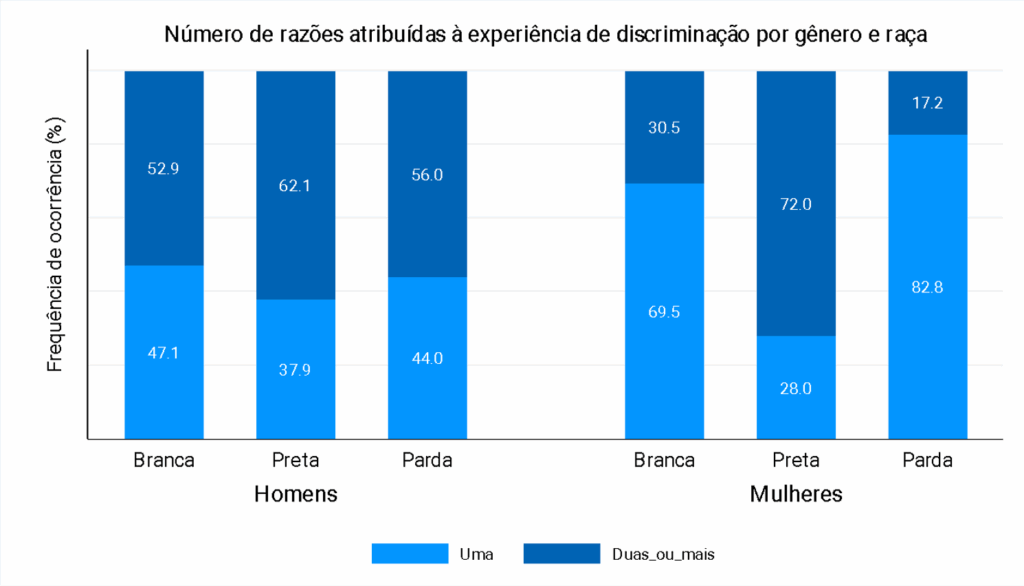84% of Black respondents have suffered racial discrimination in the country, according to a study that applied, for the first time at the national level, the Everyday Discrimination Scale, a tool developed to measure the perception of discrimination experienced by individuals in their day-to-day lives;
Black women face inequality disproportionately, with 72% reporting multiple reasons for experiences of discrimination;
The subject is a continuation of the More Data Better Health research series, carried out by Vital Strategies and Umane, with technical partnership from the Federal University of Pelotas (UFPel) and support from Instituto Devive; in this edition, the survey also had the institutional support of the Ministry of Racial Equity (MIR)
São Paulo, May 2025 – For the first time, a national survey has mapped the frequency with which Brazilians feel discriminated against in day-to-day activities and the reasons attributed to these discriminatory situations. From the application of the Everyday Discrimination Scale, the study collected data on experiences of discrimination in different situations and showed that race is the main factor of discrimination in the country. The data is overwhelming: 84% of respondents who identify as Black reported having experienced racial discrimination.
The application of the scale is a part of the More Data Better Health research series, a program of innovation in health data collection, developed by Vital Strategies and Umane which has the technical partnership of the Federal University of Pelotas (UFPel) and support from Instituto Devive. For this specific module, the project also has a government partnership with the Ministry of Racial Equity.
“A growing number of studies from around the world indicate that experiences of discrimination are a form of psychosocial stress that negatively affects mental and physical health in the people who experience them. In Brazil, discrimination is recognized as one of the structuring factors of the economic, social, and health disadvantages faced by socially marginalized racial groups. The application of the scale for the first time at the national level aims to generate evidence and document the magnitude of discrimination suffered by the population daily and inform actions to combat its occurrence and to mitigate the negative effects on the lives of Black people, the most affected group,” says Janaína Calu, consultant on racial equity and health at Vital Strategies.
The collection was done through an internet questionnaire. The survey was answered by 2,458 people in the country between August and September 2024. To give accuracy to the data, considering that the survey is based on a sample of the population, sample weights were created from the data collected by the 2022 Census and the 2019 National Health Survey.
“This new study from More Data Better Health follows through on the application of population surveys on topics relevant to public health and is a valuable opportunity to contribute to the measurement and gathering of data on discrimination in Brazil. Our goal is that the information collected serves as a subsidy for public debate and for the construction and updating of public policies that promote greater equity in access to rights by the population,” states Thais Junqueira, General Superintendent of Umane.
For each of the situations listed by the study, respondents could mark one of the following options: never, rarely, frequently, always.
| I am treated with less courtesy than other people are |
| I am treated with less respect than other people are |
| I receive poorer service than other people at restaurants or stores |
| People act as if they think I’m not smart |
| People act as if they are afraid of me |
| People act as if they think I am dishonest |
| People act as if they are better than me |
| I am cursed at with profanity and insults |
| I am threatened or harassed |
| I am followed in stores |
When considering only the “frequently” and “always” answers, it was observed that experiences of discrimination were more prevalent in the Black population, highlighting three situations that approximately 50% of respondents in this group indicated having experienced. These are: “I receive poorer service”, “I am treated with less courtesy”, and “I am treated with less respect”.
More than half of the Black respondents (51.2%) report being treated with less courtesy, while 44.9% of those who self-identified as brown and 13.9% of those who self-identified as white report having experienced the same situation. The same pattern is repeated in other experiences: 49.5% of Black respondents claim to be treated with less respect, a perception shared by 32.1% of brown and 9.7% of white respondents. Discrimination also affects the service received day-to-day: 57% of Black respondents claim to be more poorly served, while this is reported by 28.6% of brown and 7.7% of white respondents.
Among brown respondents, the second most frequently perceived behavior is “people act as if they’re better than me,” reported by 37.4%. This was also the situation of discrimination most reported by white respondents, with 21.7% saying they felt this way frequently or always.
While 16.8% of Black and 20.2% of brown respondents report that people act as if they are afraid of them, 5.1% of white respondents experience this situation. Similarly, 16.6% of Black and 20.2% of brown respondents say they are seen as dishonest, a situation reported by 5.9% of the white respondents. Commerce also reflects this inequality in treatment: 21.3% of Black respondents report being followed in stores, while 8.5% of brown and 8.5% of white respondents report this situation.

When asked about the reasons attributed to the experience of discrimination, respondents could mark more than one option, and the most frequent among Black and brown respondents were: race, education or income, physical appearance, ancestry or place of origin. Of those surveyed, 84% of the respondents who self-identified as Black pointed to race as the main reason. Among those who self-identified as white, the experience of discrimination by age, gender, height, and weight (both related to overweight and thinness) was more frequent.

The survey revealed that, in addition to race, other factors often add up in the perception of the reasons for discrimination. This approach demonstrates how different forms of inequality combine, affecting groups in a complex and multifaceted way, when considering aspects such as race, gender, appearance, and socio-economic position.
The analysis of the reasons attributed to the experience of discrimination indicates that Black people report more concomitant reasons for the perception of discrimination, with about 70.9% of the Black race/color group attributing two or more reasons for the discrimination experienced.
Black women are the group that most reported two or more reasons (72%) for their experiences of discrimination, followed by Black men (62.1%). “It is critical that consideration is also given to the fact that individuals often occupy more than one socially disadvantaged position and that these can interact to shape their experiences. Therefore, the intersectionality approach, combining different categories of discrimination for analysis, is central in the process of understanding the dynamics of discrimination,” explains Janaína Calu.

The research results confirm racism as a predominant factor of discrimination in the country, directly impacting the lives of Black and brown people, especially Black women, who face overlapping discrimination by race and gender.
For Pedro De Paula, country director at Vital Strategies’ Brazil office, public health has the potential to catalyze change to address discrimination in the country. “The Unified Health System (SUS) has already proven to be a great reducer of social inequalities. Addressing major structural challenges, such as racial discrimination, should also be among the priorities of the health sector. Therefore, generating evidence on discrimination means incorporating more data to be considered when assessing the dimension of social determinants and racism in health and informing public policies aimed at combating inequalities.”
“The findings reinforce that there is no single solution to address institutional racism and that these depend on joint efforts between government, health professionals, civil society, and private institutions to promote significant changes in care for the Black population. The study highlights the importance of strengthening the monitoring of discriminatory practices in different dimensions of society—including in the access and quality of public health policies—, mapping their inequalities and understanding how they are produced and reproduced in society and access to public policies,” states Layla Pedreira Carvalho, Director of Affirmative Action Policies at the Ministry of Racial Equity.
About More Data Better Health
More Data Better Health is a program of innovation in health data collection, carried out by Vital Strategies and Umane, with technical partnership from UFPel and support from Instituto Devive and Resolve to Save Lives. The initiative seeks to strengthen more equitable and effective public policies through the generation of data that support decision-making in public administration. It focuses on testing effective data collection methodologies and monitoring emerging or underexplored themes in health.
The More Data Better Health survey is available in full at Umane’s Public Health Observatory, through this link: www.observatoriosaudepublica.com.br/pesquisas/mais-dados-mais-saude/
About Vital Strategies
Vital Strategies is a global health organization that believes all people should be protected by effective and equitable health systems. Our team works with governments and civil society to design and implement evidence-based strategies and policies to address some of the world’s greatest public health challenges. The result is millions of people living longer, healthier lives.
About UMANE
Umane is an independent, non-profit civil society organization that supports initiatives in the field of Public Health with the aim of contributing to a more resolute Unified Health System (SUS) and improving the quality of life of people living in Brazil. In 2024, Umane supported 33 projects carried out in collaboration with 89 partners, among various sectors of health, civil society, and government.
Umane operates through three programs: Comprehensive Care for Chronic Noncommunicable Diseases (NCDs), with initiatives for controlling risk factors, screening, expanding access to healthcare and monitoring risk factors in Primary Health Care; Strengthening Primary Health Care (PHC) as a coordinator of care in SUS, through support for initiatives aimed at operational improvements, team productivity, integration of services and the incorporation of new technologies to the healthcare system; and the Women’s, Children’s and Adolescent Health program, funding programs that follow and monitor unfavorable outcomes during pregnancy and the health conditions of children and adolescents in the context of Chronic Noncommunicable Diseases and risk factors. Follow Umane on social media: LinkedIn and Instagram.
More information
Analítica Comunicação – “Mais Dados Mais Saúde” (mais.saude@analitica.inf.br)
Gabriela Scheinberg – gabi.scheinberg@analitica.inf.br – (11) 91096-4944
Raíza Dias – raiza.dias@analitica.inf.br – (11) 95272-3944
Mauricio Espósito – mauricio.esposito@analitica.inf.br – (11) 99915-7583
Erica Benute – erica.benute@analitica.inf.br – (11) 99185-7078